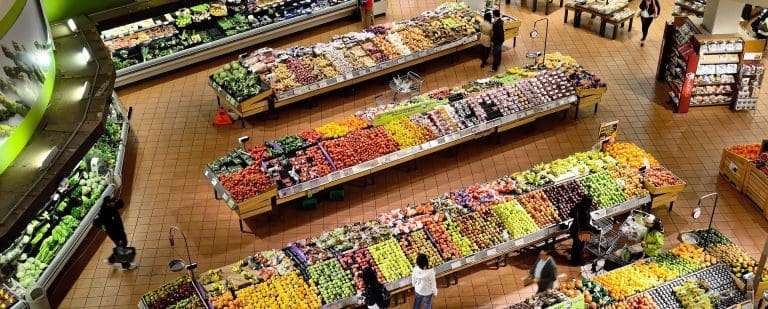Food Waste Reduction: A Practice in Sustainability and Supply Chain Management


After returning from a workshop on food waste reduction in Germany, Thomas H. Davis Professor in Business and Professor of Analytics, Pelin Pekgun met with Ashley Wilcox, Director of Sustainability Initiatives at the Wake Forest School of Business, to discuss research, collaboration and impact across sustainable food practices both locally and globally.
The invite-only workshop at TUM Campus Straubing brought together retailers and leading scholars in the field of food waste reduction, including Pekgun, whose research has been published in premier journals such as Manufacturing & Service Operations Management, Journal of Operations Management and Production and Operations Management.
Serving as an opportunity to initiate brainstorming and joint research projects dedicated to combating food waste, Pekgun returned from the workshop with new insights concerning the role of retailers in this global problem, as well as the role of food banks in food waste reduction.
“While nearly 40 percent of the food supply in the U.S. goes uneaten, millions of Americans face hunger. By reducing food waste by just 15 percent, we could feed over 25 million people annually,” said Pekgun. “Food banks play a vital role in this effort, capturing surplus food that would otherwise be wasted and redistributing it to those in need. This can not only help address hunger but also mitigate the economic and environmental impact of wasted food.”
For added context, Pekgun referenced a research project from 2018, published in the INFORMS Journal on Applied Analytics, that she participated in while teaching at the University of South Carolina. The project, centered around Harvest Hope Food Bank (HHFB), identified that while the food bank distributed 28 million pounds of food and fed over two million individuals in fiscal year 2014-15, this constituted only 40% of the annual meal gap of about 70 million pounds in its service area.
With an emphasis on efficiently utilizing HHFB’s operating budget and human and technical resources to increase food and dollar donations raised through events corresponding to various promotional initiatives, Pekgun and her co-author Sanjay L. Ahire were able to recommend an optimal strategy that provided an avenue for an additional 1.72 million meals per year, a 41% increase.
Operational inefficiencies, coupled with a lack of funding and other needed resources, can contribute to increased levels of food waste within the food bank system.
“Even within food banks, food waste can occur due to operational and distributional challenges,” said Pekgun. “The unpredictable nature of in-kind donations—without contractual agreements on quantity, quality, or timing—makes it difficult to align supply with demand. Moreover, donations are typically perishable and close to expiration, leaving food banks with limited time to sort, inspect, and distribute them. This uncertainty strains their scarce resources and can lead to food being wasted during the distribution process. Reducing this internal waste is essential not only for enhancing the efficiency and performance of food banks but also for fulfilling their mission to serve those facing food insecurity.”
The need to address such societal and business problems proved to be the motivation for Pekgun to return to academia.
“There tends to be a disconnect between academia and practice,” said Pekgun. “My research seeks to bridge that gap, addressing real-world problems that actually matter in practice, not just in theory, and bringing those insights back into the classroom to prepare the next generation of business leaders.”
For Ashley Wilcox, putting theory into practice is at the heart of her role at the School of Business. As the Director of Sustainability Initiatives, she is tasked with leading the development, implementation and evaluation of sustainability, including curriculum integration and expanding experiential learning opportunities.
Following her conversation with Pekgun, Wilcox emphasized the growing importance of integrating sustainability into the classroom to equip students with the skills and knowledge they will need, regardless of their career path.
“It’s critical for students to understand that sustainability will intersect with their work, no matter the industry,” said Wilcox. “Even if they’re not seeking out a sustainability-focused role or job they’ll need to understand how it impacts an organization’s business decisions, operations, and strategy. Our focus is on helping them build the skills and mindsets needed to address sustainability challenges in whatever career they choose.”
Driven by the theme of collaborative innovation that reaches across campus and into the broader community, Wilcox is pioneering several key initiatives at the School, including the expansion of sustainability electives through a partnership with the Environmental Studies program and the Sustainability Graduate Program.
“These courses allow undergraduate and graduate business students to explore sustainability topics like climate change and circular economies, sustainable organizational management, and sustainability law and policy,” said Wilcox.
Other initiatives include the cross-campus sustainability conference happening October 9-11 at Wake Forest University. Entitled Advancing Stewardship: Innovative Approaches to a Thriving Planet, the event serves to bring together students, faculty, community groups and organizations from The Andrew Sabin Center for Environment & Sustainability, Truist and WFU departments like biology, business, law and environmental studies.
“This event truly creates a space for interdisciplinary collaboration around sustainability issues and is bringing in some high-level, heavy-hitters in the sustainability space,” said Wilcox. “This includes the Acting Deputy Secretary of the US Department of the Interior, Laura Daniel-Davis (WFU ’90, Political Science); Former Chairman of FL Fish and Wildlife and now CEO of Property and Environment Research Center, Brian Yablonski (WFU ’89, Philosophy/Political Science); and Sustainability Strategist from Accenture, Jessica Modeen (WFU MA’16, Sustainability).”
Wilcox also took time to highlight the student-led Farrell Farmers Market, a new initiative led by seniors Kayla Peale and Berkeley Scharf, which was born out of their Environment and Sustainability Studies (ENV) Leadership for Sustainability course.
“Their goal is to bring students from all majors together to collaborate with local vendors, all from the Cobblestone Farmers Market, to bring fresh, sustainable food to campus, educate students about sustainable food systems and support local farmers and businesses,” said Wilcox. “This is another example of how sustainability at the School of Business isn’t just for business students, it’s something that involves the entire campus.”
While a global issue, the need to put sustainable practices in place around food insecurity is especially prevalent in and around the Wake Forest University community. A 2018 report from the Food Research and Action Center ranked North Carolina as #17 in the US and ranked Winston-Salem #7 in regard to food hardship.
Another key statistic comes from Feeding America, finding that roughly 50% of people facing hunger and food insecurity in the US are unlikely to qualify for the federal SNAP program, the nation’s largest food assistance program.
As affirmed by Pekgun’s ongoing research around food bank operations, these statistics emphasize the need for sustainability and optimization at food banks in order to address food insecurity for communities everywhere.
“Since SNAP is one of the first lines of defense against hunger, this is yet another reason why increasing distribution and reducing waste at food banks is critical in the fight against hunger,” said Wilcox. “Dr. Pekgun’s research on food waste is not only uncovering innovative ways to improve supply chains and reduce waste on a national scale but also holds significant potential for creating immediate impact right here in Winston-Salem, one of the most food-insecure areas in the country. Her work exemplifies how School of Business faculty research is driving meaningful change, locally and beyond.”